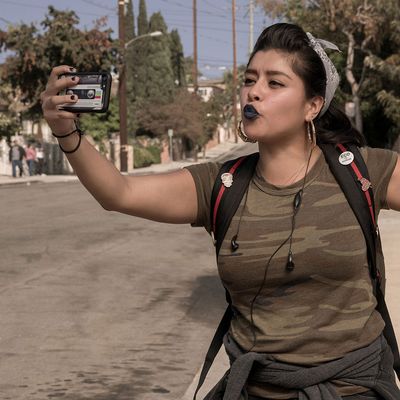
After a fantastic pilot, Vida cements its compelling and confident sense of place in this charged second episode. Once again, we begin with Marisol, who’s biking through the neighborhood with a clear destination and mission in mind: She arrives at a new art gallery in town and spray paints “fuck white art” across its façade before getting a few digs in at a befuddled white hipster and going about her day.
On the surface, Mari isn’t so obviously connected to the sisters and their central story line of grappling with their mother’s death. Relationship-wise, her tenuous connection is as the younger sister of Lyn’s on-and-off boy toy Johnny, but she’s hardly a side player. At the core of her being, Mari holds the overall narrative of how gentrification affects brown communities on a super-zoomed-in personal level. She’s inextricable from the show’s ethos and emotional storytelling. And in this episode, Vida develops Mari as more than her cause: We see a different, more vulnerable side of her when a cute, socially conscious boy steps in front of her camera. Chelsea Rendon wears Mari’s crush plainly, and her characterization through the episode slashes stereotypes, one of many results of Vida’s all-Latinx writers’ room.
Meanwhile, Poor Eddy cooks chilaquiles for the sisters and even makes them vegan for Lyn’s sake, only to have them rush out the door and Emma threaten her with legal action since she doesn’t want to sell the building Vidalia left to all three. “I could never do that to Vida,” she says.
We also meet Juniper, Lyn’s awful white boyfriend, who comes to town to have sex and then break up with her. “You waited to dump me until after I ate your ass,” Lyn says. In a less capable actor’s mouth, it would sound like a line trying too hard to be funny, trying too hard to be provocative, but Melissa Barrera sells it entirely. The writers make it work, too, by following it with the scene-ending heavy-hitter: Lyn’s final singeing words to Juniper.
Then Lyn goes back to Johnny. Even before he says it himself, it’s clear that this is a pattern for them both. She dates other guys, it doesn’t work out, she comes back to him, and she breaks his heart. Despite the fact that Johnny says all this out loud the second she shows up at his auto shop (totally, completely coincidentally on a jog! … sorry, Lyn, you’re not fooling anyone), he falls right back into the old habit anyway. They have sex in the garage, and Mari sees, which can’t be good for either one of them.
Not to get too Freudian here, but there seems to be a complicated connection between sex with Johnny and Lyn’s grief. In the pilot, she cried about her mother before they hooked up on the stairs, and it came off as being both a manipulation to get his attention and also at least a little bit genuine. This time, she cries after sex. “She’s really gone,” she says. Johnny, her mother, and the neighborhood are all knotted together — parts of her past she holds onto.
The visual details that go into Vida’s settings are impeccable. Take, for example, the clocks that hang in evil real-estate developer Nelson’s company’s lobby. Instead of the usual Tokyo, New York, Paris group, they’re labeled Silver Lake, Williamsburg, Shibuya, Noord, and Kreuzberg — neighborhoods around the world that are all considered “hipster,” a common euphemism for gentrified. That detail humorously sets the scene at Nelson’s office, where Emma goes to talk to him about options. There, she learns he gave her mother a predatory loan and that they owe more money than the building is worth. (Someone probably should have listened to Eddy — just saying!) On top of that, Nelson is just straight-up predatory, placing his hand on her leg and saying he wants to take care of her, to which Emma responds by dumping scalding coffee in his lap.
Cruz, another character briefly introduced in the pilot, also returns, and unlike Nelson, she sincerely offers her support to Emma. Their exact relationship hasn’t been defined yet, but a palpable tension cuts through their interactions, a subtle but alluring attraction just below the surface. As they did in the pilot, they again clasp hands for just a second too long to be considered casual. Vida knows when to be in-your-face, as with much of Juniper’s dialogue — and when to dial it back and play the slow-burn game.
It ends with Lyn, Emma, and Eddy eating flan together, Lyn saying “fuck it” to her veganism as Emma gets over her flan frustration in the pilot. They’re not necessarily one big happy family now, but at least they’re on the same side, determined to fight for the bar and for Vida.

